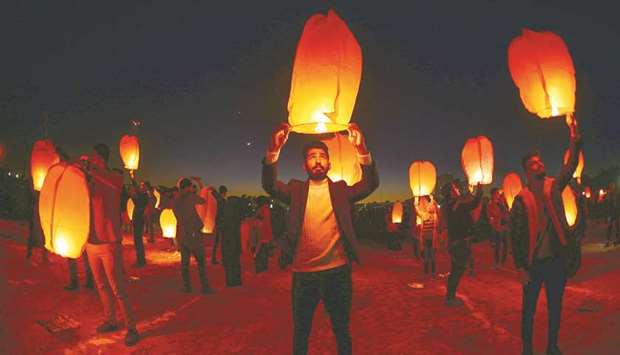A rocket attack in Iraq killed a US civilian contractor, raising fears yesterday that violence could escalate in the protest-hit country already engulfed in its worst political crisis in decades.
Washington recently promised “a decisive US response” to a growing number of unclaimed attacks on its interests in Iraq, which it blames on factions.
US-Iran tensions have soared since Washington pulled out of a landmark nuclear agreement with Tehran last year and imposed crippling sanctions.
Baghdad — which is close to both countries — risks being caught in the middle. A barrage of 30 rockets was fired at the K1 Iraqi military base in Kirkuk, an oil-rich region north of Baghdad, around 2220 GMT Friday, a US official said.
“One US civilian contractor was killed and several US service members and Iraqi personnel were wounded,” said the US-led international coalition against the Islamic State group.
A direct hit on an ammunition depot caused secondary explosions, and four more rockets were found in their tubes in a truck at the launch point, the US official said on condition of anonymity.
Federal security forces, militia units and IS sleeper cells all have a presence in Kirkuk province, which is claimed by both Iraq’s autonomous Kurdistan Region and federal authorities. Following the attack, “an escalation is possible but it is far from certain,” said Iraq expert Fanar Haddad at Singapore University’s Middle East Institute.
“More importantly, anyone pushing for an escalation in (Washington) DC will have to contend with (President Donald) Trump’s aversion to increased military engagement in the Middle East.”
The attack comes as Iraq is gripped by its biggest anti-government street protests since the US-led invasion of 2003 that toppled dictator Saddam Hussein.
Protesters, many of whom grew up in the post-Saddam era, have vented their anger at a government they consider inept, corrupt and beholden to a neighbouring nation.
Violence has claimed about 460 lives, most of them protesters, and left some 25,000 people wounded, but rallies and sit-ins have continued. Demonstrators yesterday blocked a road to an oil field in Nasiriyah, in southern Iraq, halting production for the first time since protests started in early October.
If sustained, such shut-downs could have a major impact in Opec’s second largest producer, which depends on oil exports averaging 3.6mn barrels a day.
The protests forced the resignation of the Iraqi government nearly a month ago.
Since then, Iran and its local allies have pushed to select the next prime minister, sparking more anger and threats by the president to quit.

Iraqis in the holy city of Najaf launch rice paper hot air balloons yesterday, to show their solidarity with the ongoing anti-government protests across the country.
